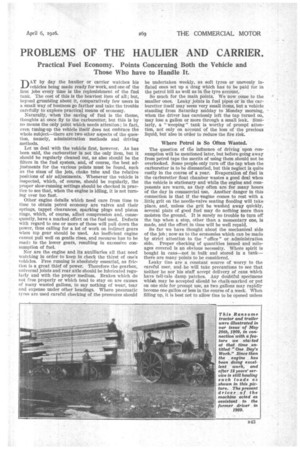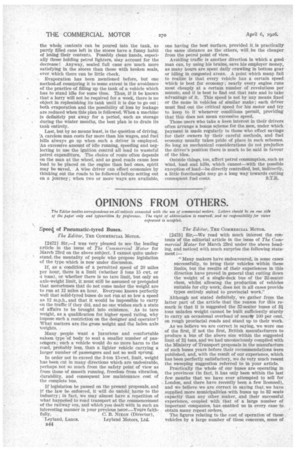PROBLEMS OF THE HAULIER AND CARRIER.
Page 27

Page 28

If you've noticed an error in this article please click here to report it so we can fix it.
Practical Fuel Economy. Points Concerning Both the Vehicle and Those Who have to Handle ft.
DAY by day the haulier or carrier watches his vehicles being made ready for work, and one of the first jobs every time is the replenishment of the fuel tank. The cost of this is the heaviest item of all ; but, beyond grumbling about it, comparatively few users in a small way of business go farther and take the trouble carefully to explore practical means of economy.
Naturally, when the saving of fuel is the theme, thoughts at once fly to the carburetter, but this is by no means the only point which needs attention ; in fact, even tuning-up the vehicle itself does not embrace the whole subject—there are two other aspects of the question, namely, administration methods and driving methods.
Let us deal with the vehicle first, however. As has been said, the carburetter is not the only item, but it should be regularly cleaned out, as also should be the filters in the fuel system, and, of course, the best adjustments for the various points must be found, such as the sites of the jets, choke tube and the relative positions of air adjustments. Whenever the vehicle is inspected, which, of course, should be regularly, the proper slow-running settings should be checked in practice to see that, when the engine is idling, it is not turning over too fast.
Other engine details which need care from time to time to obtain petrol economy are valves and their springs, tappet clearances, sparking plugs and piston rings, which, of course, affect compression and, consequently, have a marked effect on the fuel used. Defects with regard to one or more of these will pull down the power, thus calling for a lot of work on indirect gears when top gear should he used. An inefficient engine cannot pull well on gentle rises, and recourse has to be made to the lower gears, resulting in excessive consumption of fuel.
Nor are the engine and its auxiliaries all that need watching in order to keep in check the thirst of one's vehicles. Free running is absolutely essential, as friction is a great thief of power. Therefore the gearbox, universal joints and rear axle should be lubricated regularly and with the proper medium. Brakes which do not free properly or which tend to stay on are causes of many wasted gallons, to say nothing of wear, tear and expense under other headings. Where pneumatic tyres are used careful checking of the pressures should
be undertaken weekly, as soft tyres or unevenly inflated ones set up a drag which has to be paid for in the petrol bill as well as in the tyre account.
So much for the main points. We now come to the smaller ones. Leaky joints in fuel pipes or in the carburetter itself may seem very small items, but a vehicle standing from Saturday midday to Monday morning, when the driver has carelessly left the tap turned on, may lose a gallon or more through a small leak. Similarly, a " weeping " tank is worthy of prompt attention, not only on account of the loss of the precious liquid, but also in order to reduce the fire risk.
Where Petrol is So Often Wasted.
The question of the influence of driving upon consumption will be mentioned later, but before going away from petrol taps the merits of using them should not be overlooked. Some people only turn oft the tap when the carburetter is to he dismantled, but this neglect is quite costly in the course of a year-. Evaporation of fuel in the carburetter float chamber wastes a good deal when the vehicle is stationary and while the engine and components are warm, as they often are for many hours of the day in commercial use. Another danger in this connection is that if the ,engine comes to rest with a little grit on the needle-valve seating flooding will take place, and, unless the grit be washed away quickly, several pints of good fuel may do nothing more than moisten the ground, it is surely no trouble to turn off the tap when a stop, other than a momentary one, is made, and the effort in time will be well repaid.
So far we have thought about the mechanical side of the job ; now as to the economies which can be made by strict attention to the " office " or administration side. Proper checking of quantities issued and mileages covered is an obvious necessity. Where spirit is bought in cans—not in bulk and stored in a tank— there are many points to be considered.
Leaky tins are a constant source of worry to the careful user, and-he will take precautions to see that neither he nor his staff accept delivery of cans which have tell-tale damp patches. Any doubtful specimens whieh may be accepted• should be chalk-marked or put on one side for prompt use, as two gallons may rapidly become one gallon or less in the course of a week. When filling up, it is best not to allow tins to be opened unless the whole contents can be poured into the tank, as partly tilled cans left in the stores have a funny habit of losing their contents. Possibly clean hands, especially those holding petrol lighters, May account for the decrease! Anyway, sealed full cans are much more satisfying in the stores than those with broken seals, over which there can be little check.
Evaporation has been mentioned before, but one method,of countering it to some extent is the avoidance of the practice of filling up the tank of a vehicle which has to stand idle for some time. Thus, if it be known that a lorry will not be required for a week, there is no object in replenishing its tank until it is due to go out ; both evaporation and the possibility of loss by leakage are reduced when this plan is followed. When a machine is definitely put away for a period, such as storage during the winter months, the best plan is to drain its tank entirely.
Last, but by no means least, is the question of driving. A careless man costs far more than his wages, and fuel bills always go up when such a driver is employed. An excessive amount of idle running, speeding and neglecting to use the ignition control all lead to wasteful petrol expenditure. The choice of route often depends on the man at the wheel, and as good roads cause less load to be placed on the engine than bad ones, spirit may be saved. A wise driver can effect economies by thinking out the roads to be followed before setting out on a journey ; when two or more ways are available, one having the best surface, provided it, is practically the same distance as the others, will be the cheaPer from the petrol point of view.
Avoiding traffic is another direction in which a good man can, by using his brains, save his employer money, as many hours are spent daily crawling in bottom gear or idling in congested areas. A point which many fail to realize is that every vehicle has a certain speed . which is best for economy ; nearly every engine runs most cheaply at a certain number of revolutions per minute, and it is best to find out that rate and to take advantage of it. This speed is not by any means fixed or the same in vehicles of similar make; each driver must find out the critical speed for his motor and try to keep to it whenever conditions permit, providing that this does not mean excessive speed.
Those users who take a keen interest in their drivers often arrange a bonus scheme for the men, under which payment is made regularly to those who effect savings for their owners by their careful methods, and fuel economy usually takes pride of place in such schemes. So long as mechanical considerations do not prejudice the driver's position there is much to be said in favour Of the idea.
Outside things, too, affect petrol consumption, such as wind, load and hills, which cannot—with the possible exception of load—be directly controlled, but, indirectly, a little forethought may go a long way towards cutting consequent fuel costs. S.T.R.
































